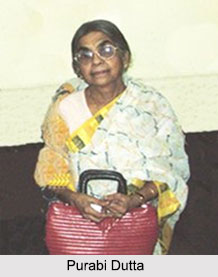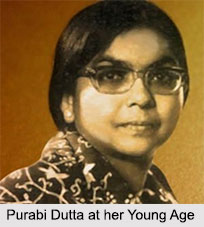 Purabi Dutta is a Bengali singer, who is considered to be one of the leading exponents of Nazrul Geeti. She was associated with All Indian Radio for a long period of time in her career. Purabi Dutta has sung several songs, most of which are Nazrul Geeti. She dedicated herself in teaching Nazrul Geeti for her entire life. Several albums on Nazrul Geeti were released, the songs of which were sung by Purabi Dutta
Purabi Dutta is a Bengali singer, who is considered to be one of the leading exponents of Nazrul Geeti. She was associated with All Indian Radio for a long period of time in her career. Purabi Dutta has sung several songs, most of which are Nazrul Geeti. She dedicated herself in teaching Nazrul Geeti for her entire life. Several albums on Nazrul Geeti were released, the songs of which were sung by Purabi Dutta
 Early Life Purabi Dutta
Early Life Purabi Dutta
Purabi Dutta was born on 17th March 1942 in Kolkata, West Bengal. Her father was Bibhuti Dutta, who was a popular Hindustani Classical vocal performer. After the initial musical training of Purabi at home, she got selected in the All India Music Competition in 1946 organized by Chetla Murari Smriti Sangeet Sammilini. Purabi Dutta won silver trophy in that competition.
Career of Purabi Dutta
Purabi Dutta was associated with All Indian Radio during 1950"s and 1960"s, when she performed in various programmes of AIR. Along with releasing several music albums including Nazrul Geeti, she had also taught Nazrul Geeti, her entire life. Purabi Dutta was also attached to "Bani Chakra" for many years. Along with that, she was also attached to Bengal Music College and was a contemporary teacher with Hemanta Mukherjee, Chinmay Chattopadhyay and Akhilbandhu Ghosh. Purabi Dutta was very close to some of the most eminent singers of Bengal like Pandit Jnanprakas Ghosh, Biman Mukhopadhyay, Manabendra Mukhpadhyay, Adhir Bagchi etc. On April 2004, she appeared for stage performance in Bangla Sangeet Mela after keeping herself away from spot light for almost one and a half year. Some of her popular Nazrul Geeti albums are:
1974 Songs of Kazi Nazrul - SAREGAMA
1975 Songs of Kazi Nazrul - SAREGAMA
1980 Valentine Special - Bengali Romantic Nazrulgeeti
1982 Halud Gandar Phul
2014 Chharo Chharo Anchal
2014 Jhum Jhum Jhumra Nachte
2014 Shiuli Tolay Bhorbela - INRECO
Songs of Purabi Dutta
Some of the popular songs sung by Purabi Dutta are as follow:
| Year | Songs |
| 1974 | Adho Rate Jadi Ghum |
| Antare Tumi Achho Chirodin | |
| 1974 | Brajo Gopi Khele Hori |
| 1966 | Chaitali Chandini Rate |
| 1980 | Chander Mato Nirobe |
| 1980 | Chharo Chharo Aanchal |
| 1974 | Chhonder Bonya Horini Aronya |
| Elo E Banante Paagal Basanta | |
| Eso He Sajal Shyam Ghano Deya | |
| 1990 | Kemone Kohi Priyo |
| Juin Kunje Mon Bhramara | |
| 1980 | Ogo Sundar |
| 1957 | Oi Godhuli Bodhur Sithite Sindur Anka |
| Palash Manjari Paraye De | |
| 1974 | Paradeshi Bondhu Ghum Bhangayiyo |
| 1975 | Paro Janame Dekha Hobe Priyo |
| 1990 | Piu Piu Bole Papiya |
| Sedin Chhoilo Ki Godhuli Lagan | |
| 1980 | Shyam Tumi Jodi Radha |
| 1968 | Soi Bhalo Kore Binod Beni |




















